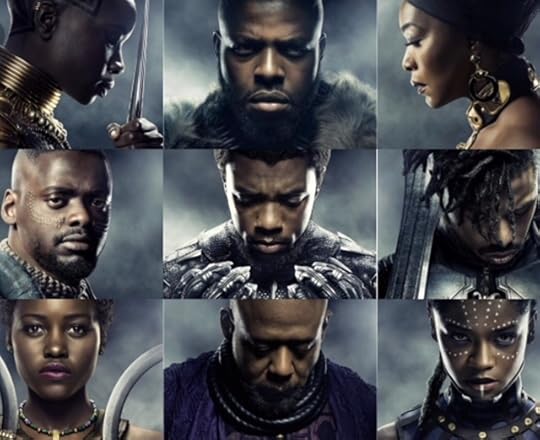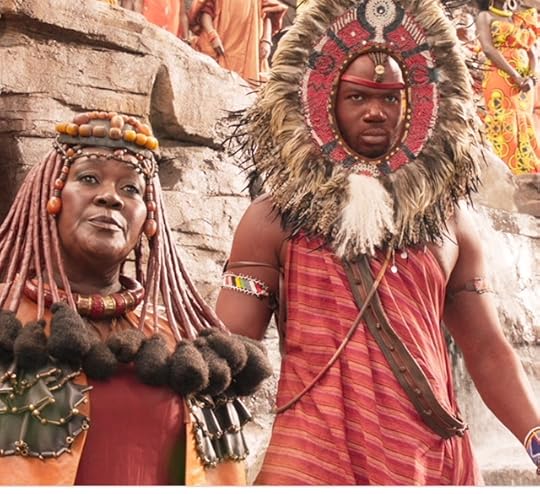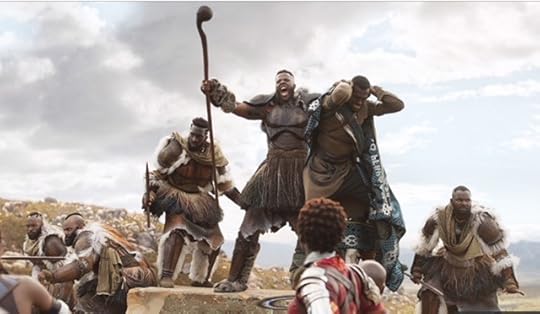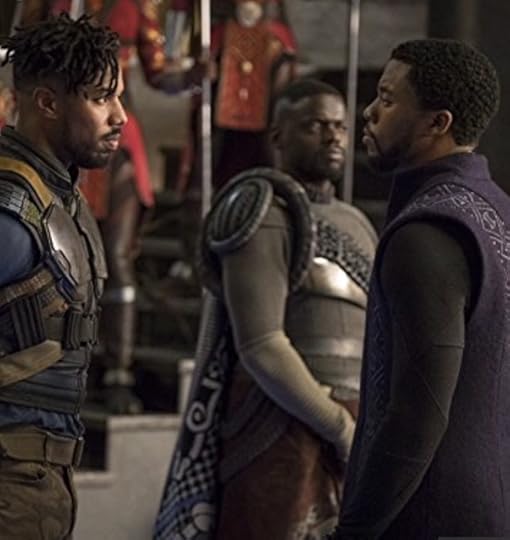Black Panther: A Call To Collective Action
Black Panther was created by by writer Stan Lee and artist Jack Kirby for Marvel Comics. The character first appeared in Fantastic Four no. 52 (July 1966) and joined the Avengers in 1968. Like the movie depicted, Prince T’Challa became king of the fictional African Country of Wakanda when his father was murdered by Ulyss Klaw. I first encountered Black Panther in Captain America: Civil War. I think it was a clever way to introduce many of us, sort of us break us in slowly into what was about to come – Black Panther Movie.
Black Panther wasn’t what I expected. I was prepared for the action like most marvel movies, and the great acting by some of the popular actors like Lupita Nyong’o, Angela Bassett, Forest Whitaker, Danai Gurira, but I was not ready for the fully fleshed out story line that captivated the world. The talent – Chadwick Boseman (who, shame on me, I’ve watched only one or two of his movies – Marshall, Message From The King, Captain America: Civil War, Gods of Egypt, Jackie Robinson to name a few) and the ‘new’ talent and I say that loosely because these actors have been acting for so long, this was just the movie that showcased them fully – Michael B. Jordan (Creed), Letitia Wright, and Winston C. Duke.
There are many things I loved about Black Panther. The story itself was a beauty. Multiple themes were explored and the writers artfully placed in the viewers’ minds, this question as they took us to Wakanda: “What if Africa had not been colonized? what if Africa had been given the opportunity to develop by herself, without interference? Without slavery? Just imagine.
The relationship between Killmonger and T’Challa represents the relationship African Americans and Africans have. I dare to say there is this unspoken coldness and distrust between us. Like long lost siblings; one taken from home and the other tied to the hip of the parent.. This uneasy relationship was brought to light through dialogue. One scene still remains as clear as day in my mind – When Erik Killmonger (Michael B. Jordan), during his ritual ‘death’ returned to talk to his dead father (N’Jobu) in the apartment they lived in California in 1992, N’jobu said, (and I paraphrase here) that his people would say they were lost. Killmonger disagreed and said, “Maybe they can’t find us because they are lost.” Me being an African gal have experienced the love-hate relationship between Africans and African Americans.
I attended a historically black College in Washington DC, (Howard) and I felt isolated the first semester I was there. I had not expected this being that we looked the same. My fellow African Americans laughed at my accent, in fact, they chose not to understand when I opened my mouth during class presentations. They kept to their clique, we Africans formed and kept to ours. I ended up making a few African American friends though, those who were curious enough to ask why I talked like that or were genuinely interested in finding out more about me as a person. It is sad though, the way we still distrust each other. Africans call African Americans Akata, which automatically separates us, and the latter call the former Africans, like Africa is a country. It is sad. The movie is a cry for us to come together as one, not just us as black people, but the many races coming together as one tribe, the human tribe.
I’m assuming almost everybody has watched the movie by now because there are major spoilers below. Here’s what I loved and learned from watching Black Panther a second time.
Authentic and Well Researched
I came out of the theatre feeling like I had experienced a groundbreaking event, an eureka moment, not merely watched a movie. From the story line to the costumes created by Ruth E Carter., it was obvious the time invested and tons of research conducted. Somalian Waris Duale made a detailed collage of the tribes Ruth emulated to bring the tribes and Wakanda to life. See Link . I for one, was fascinated and very distracted by Isaac de Bankole, the elder of the river tribe.
The weapons of choice, particularly for the women was something to behold. 
Rewrites the African Narrative
African countries are often depicted as dangerous, disorderly and corrupt. Not so Wakanda. From their orderly conduct in selecting a new king, to their bustling, clean cities, advanced technology, and peaceful country sides, these contradict the narrative the West has for many years told of African countries. I walked out of the theatre a few inches taller and so did my fellow brothers and sisters.
Majority Black Cast
Many of the cast members are from the African continent or Caribbean (also an extension of the African continent): Lupita N’yongo – Kenya, Letitia Wright= Guyana, Danai Gurira – Zimbabwe, Florence Kasumba – Uganda, John Kani – South Africa, Winston Duke – Tobago, Daniel Kaluuya – Uganda, Oh, and Chadwick Boseman traced his lineage; he’s part Yoruba (Nigeria), Kimba and Mende (Sierra Leaone), Jola (Guinea Bissau0 which are in West Africa. This added to the authenticity of the movie. And the accents (some were better than others, but they tried). The best and most authentic accent remains M’baku’s which unequivocally, hands down is Nigerian.
Our Parents Aren’t Perfect
There comes a moment in our lives when we realize that our parents aren’t perfect. And there comes a time when we must challenge them for their bad choices. The scene where T’Challa confronts his father T’Chaka in the land of the dead for killing his brother, hiding it and abandoning his nephew, that is when, in my opinion, he became king,
Everyone Deserves A Chance
The tribes were given the opportunity to challenge T’Challa for the throne. This was not a dictatorship. He was divested of the power of the panther and came as any other ordinary man to the battle ground.
Loyalty Should Never Mean Blind Followership
General Okoye (Danai Gurira) believed that she was loyal to the throne even if it meant the person sitting on the throne did not have the best interest of the kingdom at heart. This is what she had been fed from a young age (assuming she had been groomed for this).It took her some time, but she realized that she had to make up her own mind on the right thing to do.We (the citizens) must never be afraid to challenge the status quo.

Dora Milaje
The leadership role of the women in this movie cannot be overemphasized. History proves that women held leadership positions for centuries in Africa. It’s not a new thing. From the dual roles the Kings of Dahomey Kingdom in present day Republic of Benin had with the Kpojito, female counterparts, to their to their female body guards, Queen Amina, Moremi, Queen Sheeba to name a few.
Do Not Be Deceived, Self Interest Still Rules
Your best friend can betray you if he/she feels you don’t have their best (self) interest at heart. Take W’Kabi (David Kaluuya) and T’Challa (Chad Boseman). I so loved their friendship, but when T’Challa didn’t deliver on his promise to bring Klaw back, W’Kabi’s eye changed o.
Love
Black love is just that – love. No baby mama drama, no violence. T’chaka froze with love when he saw Nakia. He did everything he could to make her stay without her having to compromise her future and her passion. A beautiful love story.
The Beauty of Dual(Multiple) Utility Validated
I’ve always placed objects or things that can be used in multiple ways at the top of my list. Did you all catch that crossing of the arms over the chest used in greeting and also used to reboot the hologram spaceship the CIA agent Everett K. Ross flew to stop the space ships on their way out of the country to start world war III? I thought that was super cool.
Find the Source
At the end of the movie (not the scenes after the credits), when the other kids were so entranced by the space ship T’Challa and Shuri (Letitia Wright) brought to Oakland California, only one of them walked up to T’Challa to ask “Who Are You?” The scene reminded me of that one leper out of the nine who came to thank Jesus when he healed them. He sought the source. It’s the source that matters in the end. You find that and you never have to worry another day in your life. I also noticed that the tribe leaders asked this question- First was W’kabi when Killmonger brought dead Klaw to the border of W’Kabi’s territory. Second time was when the tribe leaders met to face Killmonger when he was brought to court. It was an important question, a person’s name was important. Identity was and is important.
A Call to Action
It was not lost on me that the opening of the movie started with the rescue of heavily covered young girls by militants. Again, speaking to the issues of our day, the Chibok girls and other young girls, the most recent in Yobe, State Nigeria.
When a movie speaks to the political and socioeconomic issues of our time, not mincing words and giving the viewers something that validates them and leaves them something to ponder on and ask the question What Next? , it becomes more than just entertainment, it’s a call to action.
I give Black Panther a 5.0/5.0
What did you think about the movie? What were your take-aways?

Wakanda Forever!!!



















